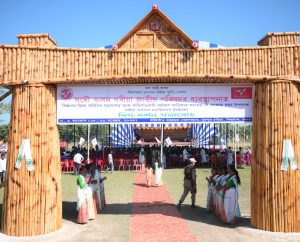The Bharatiya Janata Party (BJP)-led government in India’s northeastern state of Assam plans to conduct a census on indigenous Muslims in the state. While the decision is ostensibly for the community’s “socio-political and educational upliftment,” it is also aimed at reaping electoral dividend for the ruling BJP.
Early this month, the Assam cabinet approved the census, describing it as a “socio-economic survey” of the state’s 4.2 million “khilonjiya” or indigenous Assamese Muslims, who comprise members from the Goria, Moria, Deshi, Syed and Jolha communities.
The survey will be carried out by the Directorate of Char Areas Development, which is to be renamed as the Directorate of Minority Affairs and Char Areas.
An official statement from Chief Minister Himanta Biswa Sarma’s office said that the findings of the survey will enable the government to adopt “suitable measures” for the upliftment of the state’s indigenous minorities.
The decision to identify five groups as indigenous is based on the recommendations of seven sub-committees constituted by the state government and fulfills a long-standing demand of these communities for a socio-economic survey for special welfare measures. However, previous governments were hesitant to take the decision. These groups have complained that the large population of Bengal-origin Muslims posed a threat to their ethnic identity and culture.
The five communities are one of the three Muslim groups in Assam, which include Bengal-origin and Hindi-speaking Muslims. The Assamese Muslims comprise 35 percent of the state’s total Muslim population of about 12 million. Muslims are 34 percent of Assam’s total population of about 35 million, which is the third highest among all states and union territories in the country.
The Assam government’s decision for the census must also be viewed in the backdrop of the impending general elections next year. The BJP and its allies hope to improve upon their tally of 18 seats from the country’s northeast won in the last general elections in 2019. If a senior BJP functionary is to be believed, at least two seats that had voted in favor of the party during the previous elections were “unpredictable.” This explains the party’s focus on Assam which has 14 seats and the maximum among all the states in the frontier region.
So, the decision for the census is also a tactic to consolidate the indigenous Muslim communities in favor of the BJP and a step towards further polarization in the state between Bengal-origin Muslims comprising both citizens and foreign nationals and the rest of the populace. This had helped the party reap rich dividends in the recent past.
Bengal-origin Muslims have maximum political clout among all the Muslim communities in Assam. According to one estimate, the Bengal-origin Muslim community is the deciding factor in at least 25 of the 126 assembly constituencies in the state. On the other hand, the Assamese Muslims do not hold a particularly significant place in Assam’s politics, nor are they a majority in any constituency. By reaching out to Assamese Muslims, the BJP is hoping to polarize society and increase its vote share.
It must be noted that sentiment against Bengal-origin Hindus and Muslims runs high in Assam.
The BJP has effectively capitalized on the fear among several civil society organizations and a large section of the state’s populace of being reduced to a minority in their own homeland if the growth of the Bengal-origin Muslim population is not curtailed. The government has launched a crackdown on child marriage and has decided to ban polygamy, which is practiced by a section of Muslims in the state. (Muslims are the only community in India allowed to practice polygamy legally under Section 2 of the Muslim Personal Law (Shariat) Application Act, 1937 which has now been challenged in the Supreme Court.)
Earlier, Chief Minister Sarma said that the BJP would not need votes from the “Miya,” as the Bengal-origin Muslim community in Assam is referred to, for 10 years.
Recently, the government indicated that efforts would be made for the identification of foreign nationals in the state who had fraudulently enrolled their names in the National Register of Citizens (NRC), which was an exercise to enlist the names of citizens in Assam. The process, which was completed in 2019 had also identified about 2 million foreign nationals residing in the state.
This apart, the Assam government has plans to introduce a “crash course” for members of the foreigners tribunals in the state to help them determine the citizenship of suspected foreigners in the state after they are referred either by the Election Commission or the police. Many judgments of these tribunals have been challenged in the higher court for erroneously declaring citizens as foreign nationals.
































